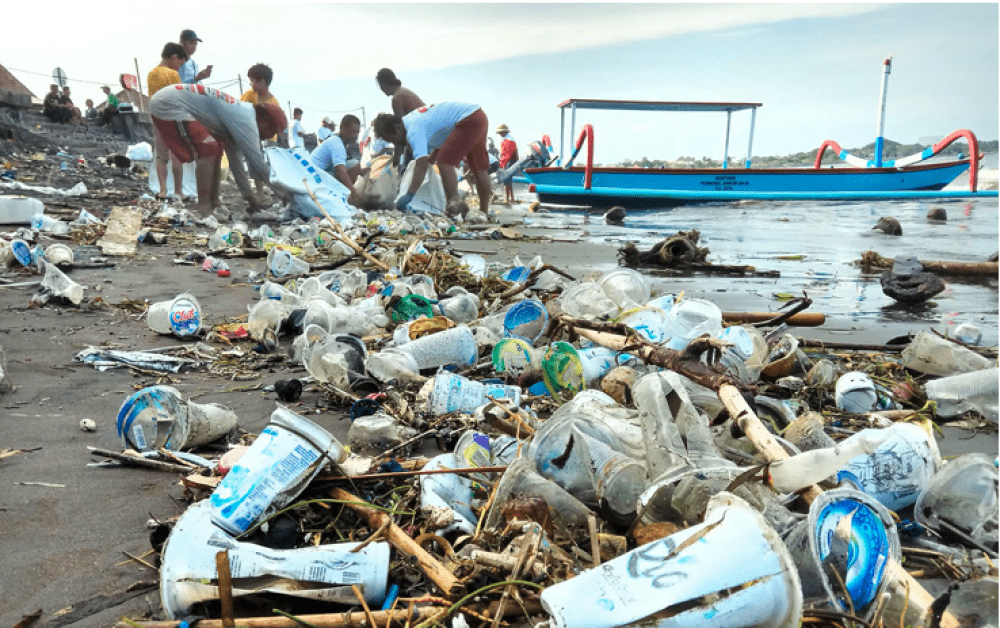Original post on The Jakarta Post
Both at home and abroad, plastic waste is a mounting problem that is not going to disappear on its own. The United Nations estimates that 8 million tons of plastic is dumped into the ocean worldwide each year, with Indonesia contributing upward of 600,000 tons of marine plastic pollution according to the Indonesian Institute of Sciences. These levels are reported to make Indonesia the second largest marine plastic polluter after China.
If this continues unchecked, the problem will only continue getting worse, especially during a pandemic where we rely on single-use plastic items such as takeaway cutlery and essential personal protective equipment gear like masks and gloves.
There is no doubt the pandemic places huge pressure on waste infrastructure. According to UNEP, medical waste in the form of disposed COVID-19 tests and IV bags in Jakarta has risen by a staggering 500 percent, far outstripping the capacity to incinerate or sterilize it as required by law.
Other Asian cities have reported similar spikes in plastic waste. While the Indonesian government has stated goals to triple the nation’s capacity to collect plastic waste by 2030, local leaders can – and must – take initiative to battle this growing crisis on the municipal level now.
As highlighted by key members of the Association of Pacific Rim Universities (APRU) Sustainable Waste Management Program including program director Yong Sik Ok of Korea University and Tsinghua University’s Xiaonan Wang, closing the plastic loop rests urgently on the collaboration of governments, researchers and industries toward intelligent design.
So how do we begin on the local level? Knowledge sharing is an essential way forward and there are different lessons that can be learned from our neighboring peers. Through the Asia Pacific Mayor’s Academy organized by 6 collaborators including APRU and United Nations Economic and Social Commission for Asia and the Pacific (UN ESCAP), leaders from different cities across the region came together to discuss urban challenges and share solutions that may be applicable to different scenarios. The stories of a plethora of cities rebounding during unprecedented times sheds light on emerging possibilities to rebuild.
Looking toward the Philippines in Ormoc city, multi-stakeholder engagement from different levels of government and the private sector along with NGOs and the public was a key to alleviating the city’s significant waste management issues. The implementation of a more integrated solid waste management system and single-use plastic products regulations ordinance was supplemented with complementary measures such as projects aimed at tackling marine waste to support healthy oceans.
Besides launching new programs and engaging stakeholders, Ormoc has also emphasized smart green technology while looking out for new financing mechanisms that can supply the capital needed to fund the city’s burgeoning sustainability programs.
Not only is this positively impacting the plastic waste problem, the multifaceted approach is driving a holistic Resilient and Green Recovery Plan focused on realizing a circular economy. This not only creates better livelihoods and standards of living for locals today with a cleaner and more efficient city, the new green infrastructure is seen as a way to help safeguard the city moving forward and secure its longevity.
With clearly articulated objectives by the Ormoc mayor’s office, different parties across a range of industries can better understand how to progress their businesses while moving cohesively toward common goals that better society.
An example of how industries have been forced to innovate in the wake of COVID-19 while tackling the rising plastic issue can be found in Koh Tao, Thailand. As tourism declined drastically during the pandemic, the island’s dive boats and tour operators lost the lifeblood of their businesses. To assist people seeking work, Koh Tao was able to secure funding that put people from the tourism and transport industries cleaning up the island.
In addition to cleaning up marine waste while giving people an income during the height of the pandemic, the program also provided life skills with financial literacy training from company sponsors. This temporary measure is just one solid example of how a cleverly designed initiative can fulfill a variety of needs during a time of need.
But while it’s important to tackle immediate problems (such as unemployment), it is also essential to focus on not just restoring the status quo, but doing so in a forward looking manner. Koh Tao leveraged the forced absence of tourists as an overdue opportunity to explore how best to implement a “Smart Island” sustainable tourism model.
By factoring environmental impact more prominently into their operations, Koh Tao is forging a path that better manages natural resources and protects biodiversity while providing economic opportunities and stability to its citizens. For an economy that heavily depends on tourism, there was tremendous wherewithal and leadership needed to evaluate how to keep families afloat while also rebooting and rebuilding the economy with a more resilient and sustainable model.
With Indonesia taking strides to address plastic waste with ambitious measures, it’s clear that there must be great participation and education across all levels of society and a wave of innovative solutions.
There are reasons for optimism. It’s been reported that the Environment and Forestry Ministry has recently pushed producers to upcycle and repurpose waste raw material from trash banks into useful items. Such actions can go a long way towards realizing better waste management in a greener circular economy.

